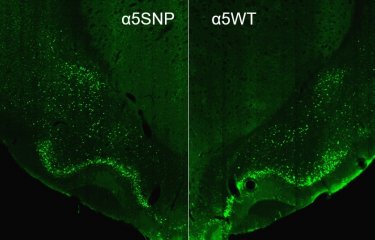Tobacco, alcohol, cocaine – addictive substances are responsible for multiple health problems. Neurobiology researcher Morgane Besson is seeking to solve the biological mysteries underpinning consumption of these products. Her research raises crucial questions: Are we all equal when it comes to addiction? Does our behavior have a lasting impact on the biology of our brain?
From university studies to field research into gibbon behavior and a stint at the prestigious University of Cambridge, Morgane has continued to be driven by a fundamental question: what are the biological factors underpinning our thoughts and decisions, even in pathological situations?
Insatiable curiosity, from infinitely large to infinitesimally small
Morgane has been interested in the mysteries of the universe ever since she was little. Aged just ten, she would ask her father questions about the limits of the cosmos and the nature of "nothing." At high school, this desire to understand the world shifted to the infinitesimally small following a biology lesson about the brain and synapses. Morgane's passion for science led her to specialize in behavioral biology at university. For her first-year Master's internship, in collaboration with the Natural History Museum, she studied the behavior of gibbons at Clères Zoological Park, with the aim of improving their well-being. But her true vocation was brain research, and she went on to complete a PhD in neurobiology at the Institut Pasteur before spending three years as a postdoctoral fellow at the University of Cambridge.
Back to the Institut Pasteur to tackle the mysteries of addiction
Morgane was intrigued by the fact that some people develop addictions while others are able to control their consumption. She began to explore the neurobiological mechanisms underpinning this disparity.

Addiction is a brain disease comparable with depression, characterized by biochemical dysfunction and a reorganization of brain circuits.
Genes: key to understanding tobacco addiction
In the neurobiology laboratory led by Uwe Maskos, Morgane is studying the genetic basis of addiction. By comparing the DNA of addicted and non-addicted smokers, A genetic mutation linked to smoking has been identified. This mutation influences the formation of nicotinic receptors in the brain, which interact with nicotine.
"Smokers with this mutation are twice as likely to develop an addiction."
How drugs hijack our brain
Drugs act on our brain by activating specific receptors such as nicotinic receptors, thereby releasing the "feel-good hormone" dopamine and triggering pleasant sensations. This "reward system" is crucial for our survival, as it encourages behaviors that are beneficial for us, such as eating and drinking. But drugs hijack this circuit, creating a desire to take them repeatedly.
Routine: a double-edged chemical phenomenon
Over time, drugs also modify the neural circuits associated with our daily routines. We are creatures of habit, and simple things like getting up or having a coffee can become ingrained. But harmful behaviors such as drug consumption can also become habits. Morgane points out that the question of mental health is often neglected in France, where there is a lack of effective treatments for alcohol or smoking addiction and there are no solutions at all for cocaine.
« More research is needed, and support is also needed for people suffering from addiction. »
The impact of personal history on the brain
Morgane also incorporates environmental factors into her research. The history and context of each individual play a crucial role in susceptibility to addiction. Working in collaboration with psychiatrist and addiction specialist Romain Icick, she collects patient data to establish links between genome, lived experience, personality and substance use. Emotional dysregulation can increase the risk of addiction, influenced by genetic factors and life experiences.

Society often thinks that you just need willpower to overcome an addiction. But research reveals that there are complex biological phenomena at play that still need to be elucidated.
Key dates in Morgane Besson's career
2002: Master of Advanced Studies (DEA) in Behavioral Biology, Université Paris 13.
Research internship: Neurobiology Laboratory specializing in Learning, Memory and Communication, UMR CNRS 8620, Orsay, France.
Characterization of brain regions involved in centrophobism/thigmotaxis behaviors in Drosophila melanogaster.
2001: First-year Master's in Cell Biology and Physiology, specializing in neuroscience. University of Rouen.
Clères Zoological Park.
Behavioral characterization of two families of gibbons (Hylobates concolor) and the impact of environmental enrichment.
2002-2006: PhD at Université Paris VI, specializing in brain-cognition-behavior.
The role of neuronal nicotinic acetylcholine receptors in nicotine addiction, Receptors and Cognition Unit, Institut Pasteur. Supervised by Professor Sylvie Granon and Professor Jean-Pierre Changeux.
2007-2010: Postdoctoral fellowship. Department of Experimental Psychology, University of Cambridge, United Kingdom. Supervised by Professor Trevor Robbins and Professor Barry Everitt.
Research into the neural and molecular basis of impulsive behavior and its relationship with cocaine addiction.
2010-2013: Postdoctoral fellowship. Integrative Neurobiology of Cholinergic Systems Unit.
Since 2013: Expert research associate (permanent; equivalent CR1).
Integrative Neurobiology of Cholinergic Systems Unit, UMR CNRS 3571, Institut Pasteur, Paris.
Research into the impact of genetic and environmental factors and their interactions with the nicotinic acetylcholine receptor in the processes underpinning drug addiction and various related neuropsychiatric disorders. Team leader: Dr. Uwe Maskos.
2022: Accreditation to supervise research (HDR), Université Paris 11. Research into vulnerability to drug addiction and various related psychiatric disorders and characterization of neurobiological correlates.
Awards
2014: Gilbert Lagrue Award from the Fondation de France (for research on nicotine dependence)





